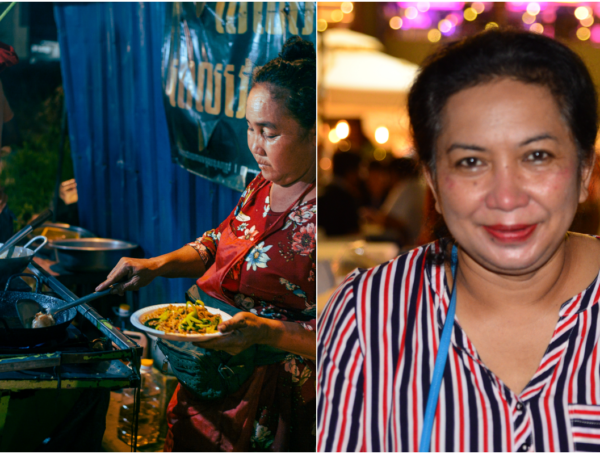Disclaimer: In Real Life is a platform for everyday people to share their experiences and voices. All articles are personal stories and do not necessarily echo In Real Life’s sentiments.
Malaysian culture is made up of many components, from multiethnic delicacies to hot tropical fashion. However, deeply embedded in the psyche of the average Malaysian is a pervasive hatred of women.
The recent Libresse debacle only proves it.

Let’s start at the beginning: the feminine hygiene company Libresse launched the “Know Your V” campaign as a form of education and awareness regarding vaginal health and menstruation. In a country which lacks a comprehensive sex education programme, it was a truly revolutionary step forward for Malaysian women.
The #KnowYourV campaign also featured a video created by agencies Havas Immerse and Directors Think Tank. The video went on to win the YouTube Malaysia Ad of the Year award from YouTube Works, as well as the top spot in the Personal Care and Health category.
Libresse then went on to push taboos on sex further by releasing their V-Kebaya designs in time for this year’s Malaysia Day. Taking inspiration from the kebaya designs worn by Peranakan women, the flower motifs were yonic (resembling vulva) to represent the “v” that they were hoping girls and women would get to know better.

The limited edition design adorned the packaging of their sanitary pads. These designs, a vulva heart placed in the middle of peonies and chrysanthemums, were done in collaboration with Muma Malaysia.
And then controversy struck.
The chairperson of MAYA, Dr Safinar Salleh, issued a statement against the V-Kebaya designs, hoping for “Libresse Malaysia to withdraw this promotion immediately”. She said that the ads undermined “the dignity of women” and violated “the norms of decency”.
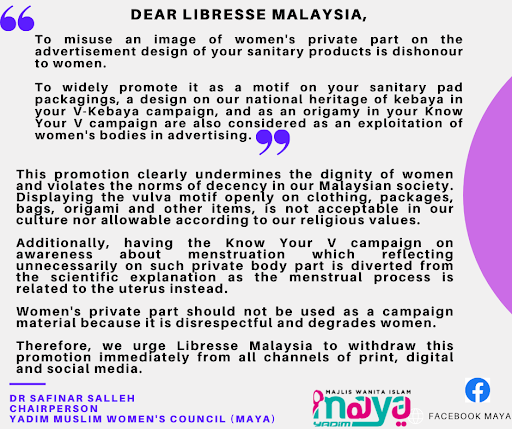
But MAYA weren’t the only ones to find the Libresse ads offensive.
Libresse also drew the ire of local non-profit organisation Wardah Media, who claimed that the ad did not respect the sensitivity of women and was looking to normalise pornography. Wardah Media went as far as accusing Libresse of discriminating against women and called for supporters to boycott Libresse.
Wardah Media also elaborated further on their accusation that Libresse was promoting “porno”. They proposed the question of what men would imagine when looking at the flowers, saying that the brand reduced the private parts of women to a method of consumer attraction.
Libresse began trending wildly. I had cishet male friends asking me if I heard about the Libresse issue. Some netizens provided thoughtful commentary on it, and arguments brewed over dissenting opinions. Many joked online that the controversy bought Libresse more publicity than the campaign itself did.
Twitter user @TerryDieHeiden defended Libresse in a tweet containing images of actual flowers that resemble the V-Kebaya designs. Many other Malaysians came together to support Libresse’s campaign, including Sharifah Amani.
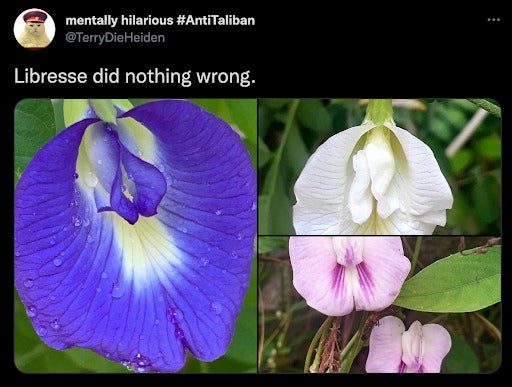
Sadly, in response to all of the outrage, Libresse ended up pulling the ads and posted apologies on their social media pages.
At last, the evil was defeated.
However, the issue has only brought up the local double standards and hypocrisy in dealing with female sexuality and female sexual health.
Murni, an older Malay woman of my acquaintance, told me that she wasn’t surprised by the furor as such beliefs and taboos are ingrained from very young. She related an anecdote from her schooling days: “my school would invite those speakers to come talk about female reproductive organs and breast cancer and stuff, tapi in the end they tell us that cannot do pap smear* because we are all virgins.”
*a pap smear procedure involves a doctor swabbing cells from the cervix to be tested for cervical cancer and signs of inflammation (recommended to be done regardless of sexual activity)
As for myself, the school I went to made us sign abstinence-until-marriage cards, so I don’t know who had it worse.
Are Malaysian women truly valued?
Twitter user @Marina_Ibrahims pointed out the hypocrisy of the condemnation against Libresse in a tweet containing images of Malaysian ads – ones in which women are explicitly sexually objectified. These ads contained sayings such as “isteri ku yg sendat, dan ketat.. abg hari-hari melekat” and “abg ku keras macam besi”.
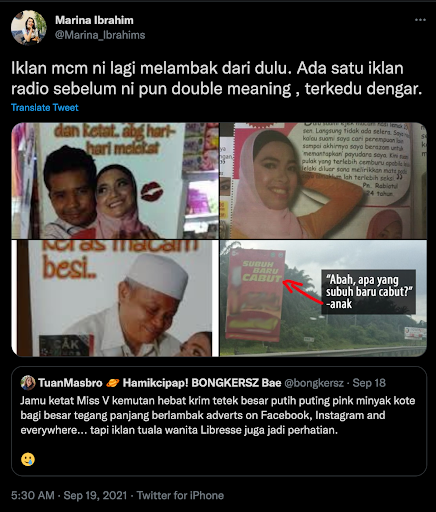
One of the ads is for a breast enlargement product. The woman in the ad describes how her husband makes fun of her small breasts, describing them as a 20 sen nasi lemak packet. “Langsung tiada selera.”
There is a double standard in the openness of such ads, depictions that weaponise female sexuality, in contrast with the Libresse ads (which address vaginal health – a topic that isn’t necessarily sexual).
But that’s not all.
The Libresse fiasco also comes days after the Malaysian government filed an appeal in hopes of overturning a landmark court decision that gives the foreign born children of Malaysian women the right to Malaysian citizenship.
Both of these incidents and situations like what happened in Murni’s school give rise to the idea that Malaysian women are like delicate flowers to be protected, or beasts to be contained; that the sensitivities of Malaysian women are easily offended; that the resemblance of an artistic flower to a woman’s genitals is sexual.
The problem is that these incidents and ideas aren’t isolated occurrences. They stem from the same issue: a Malaysian culture of misogyny. It is a disease embedded within our communities, a weapon that our women thoughtlessly use against one another. Twitter user @faizalhamssin made a pertinent point in his tweet – that “the notion of women owning or celebrating their own body is dangerous”.
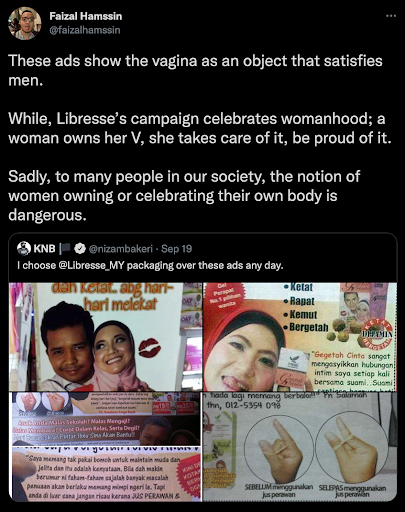
It’s a tumour that resists excision too. Speaking up about how Malaysian women are coddled and condescended to only leads to dogpiling hatred and accusations of misandry or “feminazism”.
Sex education is sorely lacking, and dangerously so.
65% of male participants in a 2019 Klang Valley survey were found to be unaware of how sexual consent works. In addition to that, a press release dated 17 September 2021 by the Joint Action Group for Gender Equality noted that existing legislation on sexual harassment are inadequate, and that sexual harassment itself was prevalent. Consider how this is, at the very least, disrespectful and degrading to women in real life situations.
Besides that, sex education is rarely sought or received from parents and guardians, let alone teachers. The taboo on speaking about sex is too strong. Where exactly is anyone supposed to find resources for sex education here? How can we be certain that parents/guardians who do educate their children on sex are teaching them about it based on scientific research and findings?
But all you’ll hear is, “oh wait, women aren’t supposed to be having sex.”
Perhaps it’s telling that ideas of gender equality are regarded as budaya barat.
What, then, are our budaya and adat regarding our women?
For more stories like this, read: “It Was Not Rape, But It Felt Like It”: Malaysian Women Share How Their Consent Was Violated.
You might also like
More from Real People
‘A RM100 fee cost a company 5 years of revenue’ shares M’sian
This story is about a Malaysian who learned that bureaucracy can be defeated simply by not arguing with it.A billing …
‘I quiet-quit, upskilled, and tripled my salary,’ shares M’sian engineer
This story is about a Malaysian who learned that loyalty without leverage leads nowhere in the corporate world.After years of …
‘I did everything right, and it still wasn’t enough’ shares M’sian graduate
This story is about a Malaysian graduate navigating big dreams in a job market where a degree no longer guarantees …






